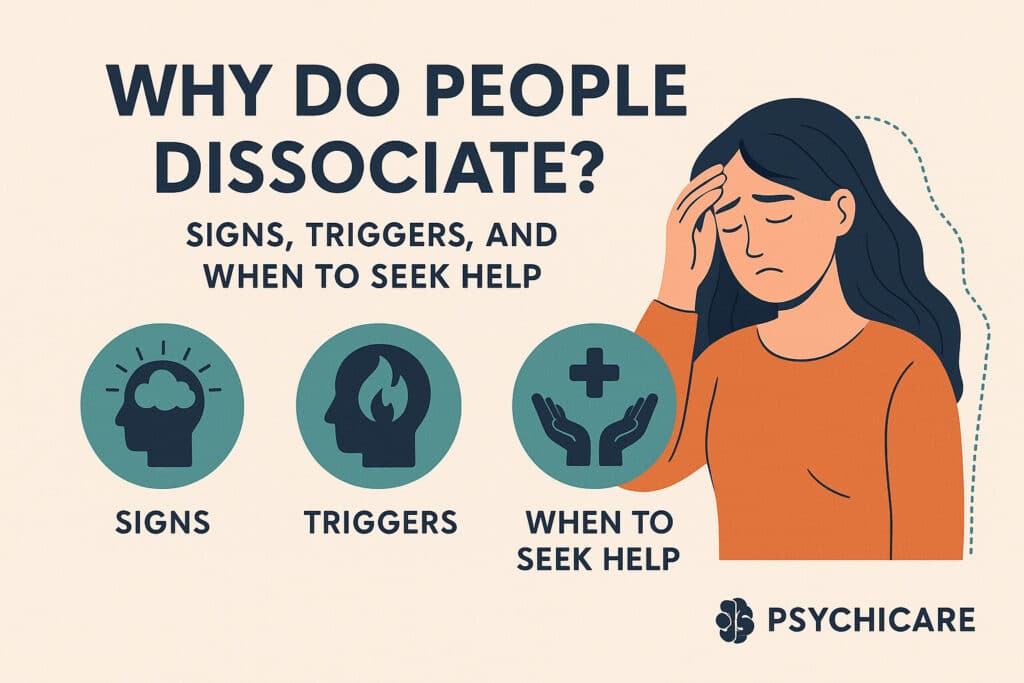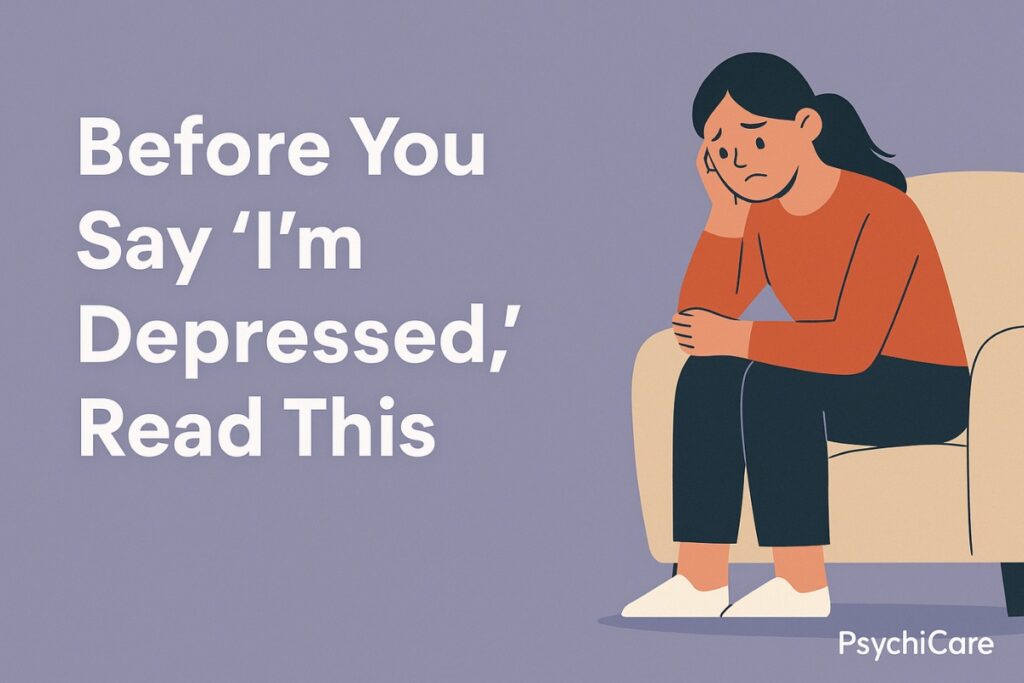Clinically reviewed by: Vidushi Sultania (Clinical Psychology), Last reviewed: October 2025
Sometimes life feels strangely unreal. You may sit in a room but feel detached from it, as if everything is happening far away. Some describe it as watching themselves from outside their body. This experience is called dissociation.
Dissociation is the mind’s way of creating distance. It disconnects you from thoughts, emotions, or memories that feel too overwhelming. Mild dissociation can happen during stress, exhaustion, or shock. But when it becomes frequent or disruptive, it may signal a dissociative disorder, a recognised mental health condition in the DSM-5.
For many, dissociation is unsettling and hard to explain. It can feel like being on autopilot or moving through life behind glass. At PsychiCare, we understand how confusing it is for both the person experiencing it and the people around them.
This guide goes beyond medical terms. You will find clear answers to common questions, symptoms, causes, types, treatment along with deeper insights into what dissociation feels like, how it affects daily life, and ways to cope when it happens.
What Are Dissociative Disorders?
Dissociative disorders are conditions where a person’s thoughts, memories, surroundings, or identity become disconnected. Everyone experiences small moments of dissociation, such as daydreaming or losing track of time. But in a disorder, the disconnection is stronger, happens more often, and disrupts daily life.
The DSM-5 describes dissociative disorders as mental health conditions linked to trauma, stress, or overwhelming experiences. They are not simply about “forgetfulness” or “spacing out.” They involve changes in awareness, memory, and identity that can affect work, relationships, and overall wellbeing.
Symptoms of Dissociative Disorders
Symptoms can vary depending on the type of dissociative disorder, but most involve a feeling of disconnection from reality, self, or memory. Some signs are subtle, while others can severely affect daily life.

Common symptoms include:
- Memory gaps that cannot be explained by ordinary forgetfulness
- Feeling detached from your body or emotions
- A sense that the world around you is unreal or distorted
- Sudden shifts in mood, behaviour, or even identity
- Difficulty recalling personal details or past events
- Losing time or finding yourself in unfamiliar places without explanation
- Emotional numbness or feeling “cut off” from reality
In 2025, mental health research continues to confirm that dissociative symptoms are strongly linked to past trauma, particularly childhood experiences of abuse or neglect. They can also appear alongside conditions like PTSD, depression, or anxiety, which is why professional assessment is important.
Causes of Dissociative Disorders
Dissociative disorders usually develop as a way for the mind to cope with overwhelming stress or trauma. When experiences are too painful to process, the brain may “switch off” awareness, memory, or identity as a form of protection.
Key causes include:
- Childhood trauma, especially repeated abuse or neglect
- Severe stress from accidents, natural disasters, or violence
- Military combat and war-related trauma
- Ongoing emotional abuse or controlling relationships
- Sudden loss or grief that feels impossible to manage
- Substance misuse or extreme sleep deprivation, which can worsen dissociative symptoms
Recent findings (2024–2025) highlight that dissociation is not only a reaction to major trauma. Many people report episodes triggered by everyday stressors, sensory overload, or reminders of past experiences. Researchers also note that dissociative symptoms are often linked with other mental health conditions such as PTSD, borderline personality disorder, and complex trauma.
Types of Dissociative Disorders
The DSM-5-TR recognises several types of dissociative disorders. Each involves disconnection, but the way it shows up can differ.

Main types include:
- Dissociative Amnesia
Sudden gaps in memory that cannot be explained by ordinary forgetfulness. This may involve forgetting personal details, past events, or even identity.
- Dissociative Fugue
A rare condition where a person not only forgets their identity but may also travel or wander unexpectedly. During a fugue, they might adopt a new identity without realising it.
- Depersonalisation/Derealisation Disorder
Persistent feelings of being detached from yourself (depersonalisation) or sensing that the world around you feels unreal or distorted (derealisation).
- Dissociative Identity Disorder (DID)
Previously known as multiple personality disorder. In DID, a person experiences two or more distinct identity states, often linked to severe childhood trauma.
Some researchers also discuss other dissociative patterns, such as OSDD (Other Specified Dissociative Disorder), where symptoms do not fit neatly into one category but still cause distress.
What Dissociation Actually Feels Like
Reading a list of symptoms only explains part of the picture. Many people describe dissociation in ways that feel much more personal and unsettling. It often goes beyond simply “forgetting” or “zoning out.”
Common experiences include:
- Feeling like you are watching yourself from outside your body
- Life seems dreamlike, blurred, or as if you are behind glass
- Time feels distorted – hours pass in what feels like minutes, or the other way around
- Your body may feel unfamiliar or numb, almost as if it does not belong to you
- Sudden gaps in memory, where you cannot recall what happened moments earlier
- Acting on autopilot without real awareness of what you are doing
Some people describe it as moving through life as if in a movie. Others notice “micro-dissociations,” small moments where they lose track of a conversation or forget how they arrived somewhere. When these experiences repeat or intensify, they can feel frightening and isolating.
Normal Zoning Out vs. Dissociation
| Normal Zoning Out | Dissociation (Clinical Concern) |
| Happens when bored, tired, or distracted | Often triggered by stress, trauma, or reminders of past events |
| Brief and easy to snap out of | Can last minutes to hours, sometimes longer |
| You remain aware of your surroundings | You may feel detached from your body or the world around you |
| Does not affect memory or identity | May cause memory gaps, identity confusion, or feeling “unreal” |
| Harmless and common | Disruptive to daily life, relationships, or safety |
Micro-Dissociation and Everyday Episodes
Not all dissociation feels dramatic or obvious. For many people, it appears in small bursts, often called micro-dissociation. These are brief moments where you lose touch with your surroundings or yourself, sometimes without realising it.
Common signs of micro-dissociation include:
- Forgetting what was just said in a conversation
- Losing track of time during daily tasks
- Feeling blank or “not there” for a few moments
- Forgetting small actions, like whether you locked a door or sent a message
- Drifting off during arguments or stressful situations
These moments may seem harmless, but if they happen often, they can add up and affect relationships, work, or safety. Unlike simple daydreaming, micro-dissociation often leaves people unsettled, confused, or embarrassed afterwards.
For some, these episodes are linked to fatigue or stress. For others, they are connected to past trauma, showing up when emotions feel too intense to manage directly. Recognising them is the first step toward understanding when support may be needed.
Everyday Triggers People Don’t Expect
Dissociation is often linked to major trauma, but everyday situations can also bring it on. These triggers may not seem obvious at first, yet they can activate the same protective response in the mind.
Common everyday triggers include:
- Arguments or tense conversations that feel overwhelming
- Loud noises, bright lights, or sudden sensory overload
- Stressful work or school deadlines
- Certain smells, sounds, or places that remind you of past experiences
- Feeling judged, criticised, or emotionally cornered
- Physical exhaustion or lack of sleep
Because these triggers can vary widely, people often feel confused about why dissociation “suddenly” happens. In reality, the brain is reacting to something it connects, consciously or unconsciously to stress or past trauma. Identifying personal triggers can make it easier to prepare and practise grounding techniques before dissociation sets in.
How Dissociation Affects Relationships
Dissociation does not only affect the person experiencing it — it also shapes how they connect with others. Many people say they “switch off” in the middle of arguments, drift away during intimacy, or appear distant even when physically present. To loved ones, this can look like withdrawal or lack of care, when in reality it is a protective response.
Common ways dissociation impacts relationships include:
- Going blank during conflicts, leaving partners feeling ignored or unheard
- Emotional distance in moments that would normally be intimate or affectionate
- Forgetting parts of conversations or shared experiences, which can cause frustration
- Difficulty expressing feelings, leading to misunderstandings
- Seeming “unavailable” or unpredictable, which can create trust issues
For couples, family members, or friends, these behaviours can be painful and confusing. Without understanding, partners may assume the person is careless, cold, or inattentive. In truth, dissociation often reflects a history of emotional pain rather than a lack of love.
When explained openly, loved ones usually respond with more patience and support. Couples therapy or family counselling can also help build healthier ways of communicating and coping together.
Memory Gaps and Identity Confusion
One of the most distressing parts of dissociation is memory loss. These gaps go far beyond normal forgetfulness. People may lose track of entire hours, days, or even important life events. Some describe it as if their memories are “stored on a hard drive” but not immediately accessible.
Signs of dissociative memory problems include:
- Forgetting personal details such as your address, job, or past experiences
- Not remembering actions you recently carried out
- Discovering items, messages, or notes you don’t recall creating
- Losing time and being unable to explain where you were or what you did
For some, this extends into identity confusion. A person may feel like different “parts” of themselves take over at different times. In dissociative identity disorder (DID), these identity states can have distinct behaviours, voices, or even physical reactions.
While memory gaps and identity shifts can feel frightening, they are the mind’s way of protecting itself from overwhelming trauma. Therapy can help by slowly reconnecting these fragments, making memories safer to process, and giving the individual a stronger sense of self.
Common Triggers of Dissociative Episodes
While dissociation often begins as a response to trauma, many people notice that certain situations in daily life can bring on an episode. These triggers may be different for each person, but they tend to fall into a few common patterns.
Frequent triggers include:
- Reminders of past trauma, such as a sound, smell, or place
- Stressful conflicts at home, work, or school
- Sensory overload from noise, crowds, or bright lights
- Sudden loss, grief, or emotional shock
- Fatigue, lack of sleep, or physical illness
- Feeling trapped, judged, or unsafe in relationships
Not all triggers are obvious. Sometimes dissociation happens during ordinary events, like being criticised in a meeting or overwhelmed by a busy street. Because these responses are often unconscious, people may not understand why dissociation “just happens.” Keeping track of patterns with journaling or therapy can help uncover personal triggers and reduce their impact over time.
Coping and Grounding Techniques
Dissociation can feel sudden and overwhelming, but there are simple techniques that can help you stay connected to the present. These are not cures, but they can reduce the intensity of episodes and give you a sense of control.
Grounding techniques you can try:
- 5-4-3-2-1 method: name five things you see, four you can touch, three you hear, two you smell, and one you taste
- Holding an object, such as a stone or piece of fabric, and focusing on its texture
- Splashing your face with cold water or holding an ice cube in your hand
- Counting slowly while breathing deeply
- Naming the date, place, or people around you to anchor yourself
Other coping strategies include:
- Journaling to track when dissociation happens and what may trigger it
- Using gentle movement, such as stretching or walking, to reconnect with your body
- Creating safe routines and calming spaces at home
- Talking with supportive friends or loved ones when you feel disconnected
Professional therapy goes further by helping to process trauma and reduce the need for dissociation. Techniques such as trauma-focused CBT, EMDR, and psychodynamic therapy have shown positive results in 2025 for treating dissociative disorders.

Treatment for Dissociative Disorders
Treatment focuses on helping people feel safer in their own minds and bodies while reducing the need to disconnect. Most approaches combine therapy with support for related conditions such as anxiety, depression, or PTSD.
Main treatments include:
- Psychotherapy – Trauma-focused approaches such as CBT, EMDR, and psychodynamic therapy help people process painful memories and reduce dissociation.
- Grounding and coping skills – Therapists teach practical methods to stay present, manage triggers, and reconnect with reality.
- Medication – While there is no drug that directly treats dissociation, antidepressants or anti-anxiety medications may be used when symptoms overlap with other conditions.
- Supportive care – Group therapy, family counselling, and building safe routines strengthen recovery and improve relationships.
Research in 2025 highlights the importance of long-term therapeutic support rather than quick fixes. Recovery is often gradual, but many people improve with consistent treatment and a trusted therapeutic relationship. At PsychiCare, our therapists specialise in helping individuals navigate these challenges with care, patience, and evidence-based methods.
When to Seek Professional Help
Occasional zoning out is normal, but dissociation becomes a concern when it starts interfering with safety, relationships, or daily life. Recognising the signs early can make treatment more effective and reduce distress.
It may be time to seek professional support if you:
- Frequently lose time or cannot explain memory gaps
- Feel detached from yourself or your surroundings most of the day
- Struggle with identity confusion or sudden shifts in mood and behaviour
- Find dissociation disrupting work, school, or relationships
- Experience safety risks, such as wandering without awareness
- Feel overwhelmed by stress, trauma reminders, or emotional numbness
Reaching out for therapy is not a sign of weakness. It is a way to understand your mind better and find healthier ways of coping. With the right support, dissociation can become less frightening and more manageable over time.
Conclusion
Dissociation can feel like stepping out of your own life, confusing, frightening, and often hard to explain to others. While occasional moments of detachment are common, persistent dissociation may point to a deeper issue that deserves attention.
With the right support, recovery is possible. Therapy can help you understand your triggers, reconnect with your memories, and build coping strategies that make daily life feel safer and more stable.
If you or someone you care about is struggling with dissociation, reaching out for help is the first step. At PsychiCare, our therapists provide compassionate, evidence-based support tailored to your needs. You do not have to face this alone.
FAQs About Dissociation
Can dissociative disorders be cured?
There is no quick cure, but many people improve with long-term therapy. Treatment helps reduce symptoms, strengthen coping skills, and make episodes less frequent.
How long do dissociative episodes last?
Episodes may last a few minutes, several hours, or, in rare cases, days. The length often depends on triggers, stress levels, and whether support is available.
Can you get stuck in dissociation?
Most episodes end on their own, but frequent or prolonged dissociation is a sign that professional help is needed. Therapy can teach grounding techniques to shorten or prevent episodes.
Is dissociation the same as schizophrenia?
No. Schizophrenia involves psychosis and a loss of connection with reality, while dissociation is a disconnection from self, memory, or surroundings. They are separate conditions, though they may sometimes look similar.
What are some examples of dissociative disorders?
Examples include dissociative amnesia, dissociative fugue, depersonalisation/derealisation disorder, and dissociative identity disorder. Each has unique symptoms, but all involve a break in memory, awareness, or identity.
Can children experience dissociation?
Yes. Children may develop dissociation in response to abuse, neglect, or overwhelming stress. Early support can reduce long-term impact and improve emotional resilience.




